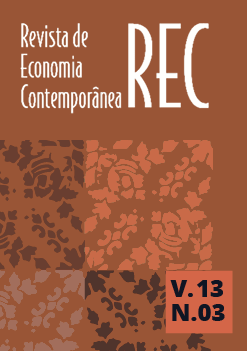O AUMENTO DA LUCRATIVIDADE EXPANDE A ACUMULAÇÃO DE CAPITAL? UMA ANÁLISE DE CAUSALIDADE DE GRANGER PARA PAÍSES DA OCDE // DOES INCREASING PROFITABILITY RISE CAPITAL ACCUMULATION? A GRANGER CAUSALITY ANALYSIS ON OECD COUNTRIES
Palavras-chave:
taxa de lucro, taxa de acumulação, causalidade de Granger // profi t rate, accumulation rate, Granger causalityResumo
RESUMO: O objetivo deste trabalho é testar a hipótese clássico-marxiana de ligação causal entre a taxa de lucro e a taxa de acumulação de capital para um conjunto de 20 países da OCDE. A metodologia utilizada baseia-se no procedimento proposto por Toda e Yamamoto (1995) para testar a hipótese de não causalidade de Granger. A especificação de teste empregada, derivada a partir da equação de Cambridge, envolve três variáveis: a taxa de lucro, a taxa de acumulação e a taxa de investimento. A consideração da variável investimento permite comparações entre as tradições clássico-marxiana e pós-keynesianas. Os resultados para a Austrália, a Dinamarca, os EUA, a Finlândia e a Irlanda são consistentes com a concepção clássico-marxiana. Por outro lado, os resultados para o Canadá, a Coreia do Sul, a Grécia e a Suécia são parcialmente consistentes com a tradição pós-keynesiana.
ABSTRACT: The purpose of this paper is to test the classical-Marxian hypothesis of causal linkages between profit rate and the accumulation of capital for a dataset of 20 OECD countries. The procedure proposed by Toda and Yamamoto (1995) to test for the Granger non-causality hypotheses is employed in the statistical procedure. The test specification, derived from the Cambridge equation, involves three variables: profit rate, accumulation of capital and investment rate. The consideration of the investment rate allows a comparison between the classical-Marxian and the post-Keynesian traditions. For the cases of Australia, Denmark, USA, Finland, and Ireland, the results provide empirical support for the classical-Marxian conception. On the other hand, in the cases of Canada, South Korea, Greece, and Sweden, the results support the post-Keynesian tradition.
Downloads
Downloads
Publicado
Edição
Seção
Licença
Todo el contenido se publica bajo una licencia Creative Commons CC-BY, salvo que se indique lo contrario.


